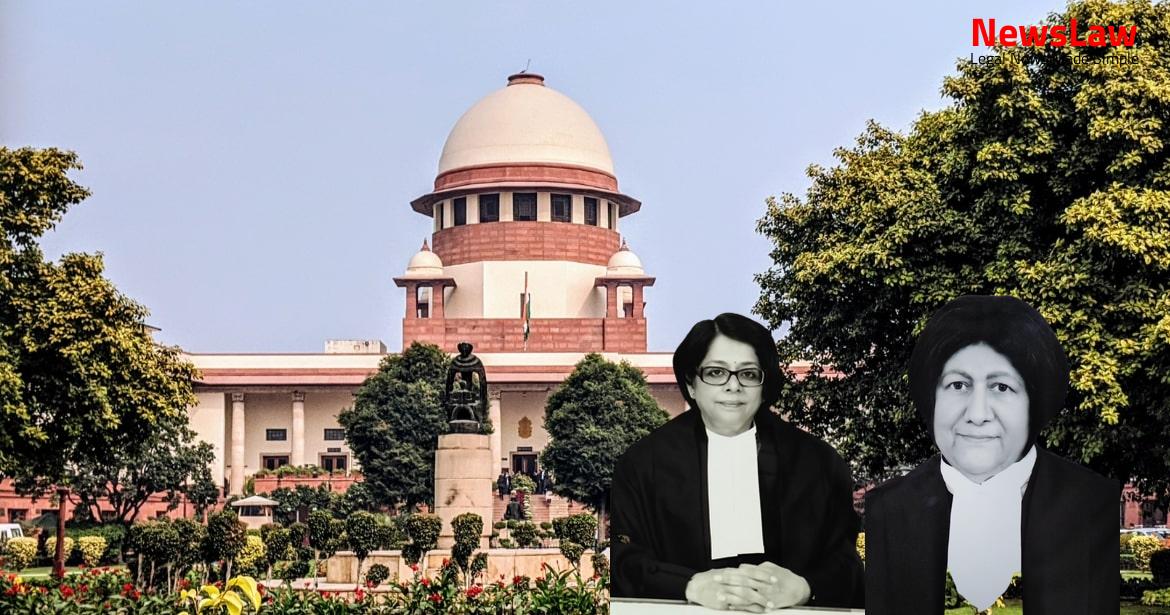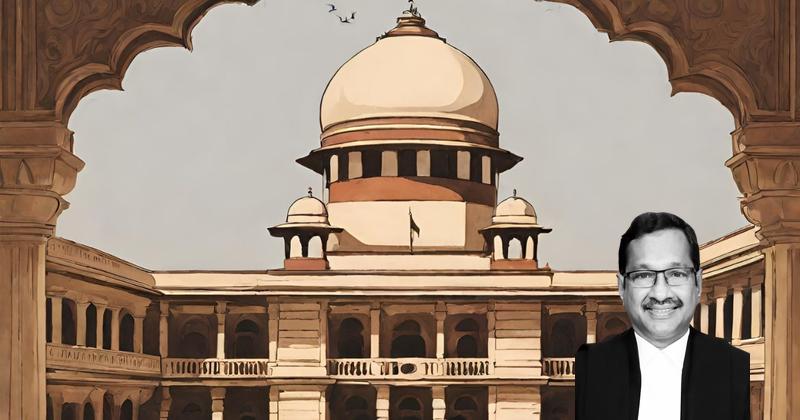Explore a summary of a significant legal case involving a dispute over land ownership under the Regional and Town Planning Act. The case delves into the court’s in-depth examination of statutory provisions and procedural compliance, shedding light on the complexities of property rights issues. Dive into the legal intricacies of the matter and gain insights into the court’s meticulous analysis.
Facts
- Plot No. 473 was divided into five parts with different owners listed in the ‘B’ Form.
- Swami Dilip Kumar Roy and Smt. Indira Devi’s names were recorded in revenue records in 1959.
- Swami Dilip Kumar Roy established the Hare Krishna Mandir in Pune.
- An order dated 20.8.1970 divided Plot No. 473.
- The Pune Municipal Corporation was incorrectly named as the owner of the road in the property records.
- Various letters and orders were exchanged regarding the ownership and division of Plot No. 473.
- Changes in the Town Planning Scheme were proposed and opposed by different parties involved.
- The Municipal Corporation’s ownership of the road was disputed, and corrections were requested.
- Multiple notices and resolutions were issued regarding the division and ownership of the plot.
- Arbitrator made an award on 30.10.1987 for the Town Planning Scheme.
- Final Plot No 694 (1240 square meters) and Plot No 173 (2079 square meters) were allotted in lieu of original Plot No 433.
- The total area allotted was 3319.9 square meters.
- For the acquisition of the land and structure, compensation of Rs.4,97,567.20/- was awarded.
Also Read: Analysis of Maintenance Laws and Enforcement Procedures
Arguments
- Mr. Adkar argued that the submission of the Appellant that the scheme could be varied de hors Section 91 of the Regional and Town Planning Act rendered the appeal liable to be dismissed.
- Mr. Adkar emphasized on the fact that the High Court had recorded specific finding regarding ownership of the Corporation as per Town Planning Scheme, with which we are unfortunately unable to agree.
- Mr. Adkar argued that it was settled that the land in question stood vested in the Pune Municipal Corporation by virtue of Section 88 of the Regional and Town Planning Act.
- Mr. Adkar submitted that Municipal Corporation had tendered a true copy of Form I prepared under Rule 6(V) of the Rules for consideration of this Court.
- Mr. Adkar argued that the High Court has recorded a finding that the suit land stood vested in the Pune Municipal Corporation in 1979, when the Town Planning Scheme became final.
- Mr. Adkar argued that the Appellant had itself contended that in view of the documentary evidence, particularly the city survey records and the award of the Arbitrator, the correction in the town planning record can be made even de hors Section 91 of the Regional and Town Planning Act, and accordingly invited this Court to make orders under Article 142 of the Constitution of India.
- Respondents have not produced materials showing compliance with the procedure under Regional and Town Planning Act.
- No remittance of the matter back to the authority due to long litigation period.
- Proper legal method should be followed for any conclusion.
- Facts pleaded by the Appellant are not in dispute.
- Incorporation of Pune Municipal Corporation’s name without following the prescribed procedure under the Regional and Town Planning Act.
- Appellant’s case cannot be rejected based on assumption.
- Provisions under Sections 68(3), 71, and 72(4) provide opportunities for stakeholders in town planning schemes.
- Mr. Adkar’s argument of assuming procedure compliance unless shown otherwise.
- Failure of the Appellant to demonstrate non-compliance of statutory procedure by authorities.
- Suggestion of remanding the matter to the Government for reconsideration.
- The litigation is in the interest of justice and not adversarial.
- Different nature of property vesting under Town Planning Scheme compared to land acquisition.
- Citation of a relevant case, Pukhrajmal Sagarmal Lunkad, regarding land release from reserve under Section 127 of the Regional and Town Planning Act.
Also Read: Interpretation of Contract Terms in Foreign Arbitral Awards
Analysis
- The High Court misconstrued Section 88 of the Regional and Town Planning Act by reading it in isolation from other relevant provisions.
- The High Court failed to address how the Pune Municipal Corporation came to be shown as the owner of the internal road without proper records.
- The High Court’s finding that the land had vested in the Pune Municipal Corporation was based on erroneous grounds.
- The High Court did not consider the discrepancies in property records regarding the private road.
- The High Court’s dismissal of the writ petition was based on a misinterpretation of Section 88 and failure to consider all relevant provisions of the Act.
- The High Court should have entertained the petition and called for an affidavit-in-reply instead of relegate to a separate suit.
- The Planning Authority may prepare town planning schemes for the area within its jurisdiction, addressing various matters specified in Section 22.
- Provisions in a town planning scheme may include laying out of land, construction and alteration of buildings, allotment of land for various public purposes, drainage, lighting, water supply, preservation of historical or national interest objects, and other related matters.
- The State Government has the power to establish regions and towns for the purpose of implementing the provisions of the Act.
- Compulsory acquisition of land for public purposes is governed by specific sections of the Regional and Town Planning Act.
- The Act provides for the constitution of Regional Planning Boards to carry out surveys, prepare reports, and develop Regional Plans.
- Ownership, area, and tenure details of original plots, along with proposals for reconstitution and transfer of plots, are specified in the draft scheme.
- The Act prohibits deprivation of property without authority of law, as per Article 300-A of the Constitution of India.
- Mandamus can be issued to direct public authorities to perform specific duties as specified by law.
- Draft schemes must contain detailed particulars of ownership, land usage, cost estimates, and scheme details as applicable.
- Procedure for sanctioning draft schemes by the State Government is outlined in Section 68 of the Act.
- The High Court must issue a Writ of Mandamus in cases where no compensation has been offered or paid to the affected party.
- The High Court retains jurisdiction under Article 226 to try both factual and legal issues in a petition.
- A disputed question of fact can be examined under specific circumstances.
- Article 300A of the Constitution includes the right to claim compensation for deprivation of property.
- The State must provide reasonable compensation when taking or controlling property for public benefit.
- In cases involving contractual obligations, a writ petition can be maintained.
- The writ court has the jurisdiction to entertain disputes involving facts, even in contractual matters.
- The writ petition is maintainable even if it involves monetary claims as a consequential relief.
- Statutory authorities are obligated to pay adequate compensation when acquiring private property for public purposes.
- The right to property encompasses various proprietary interests including hereditary and acquired rights.
- High Courts under Article 226 are duty-bound to issue a Writ of Mandamus to compel proper exercise of discretion by the Government or public authorities.
- Courts may pass orders to prevent injustice when discretion is not properly exercised by the Government or public authorities.
- The issuance of a mandamus under Article 226 requires the aggrieved person to have a legal right that has been infringed.
Also Read: Upholding Judicial Integrity: Importance of Reasoned Judgments
Decision
- The Arbitrator’s verdict is final and cannot be undone by the Planning Authority.
- The Arbitrator made an award on May 16, 1972, which is to be followed.
- The Planning Authority is directed to act as per the Award and remove Pune Municipal Corporation as the owner of the private road.
- Consequential alterations as per Section 91 of the Regional and Town Planning Act should be carried out.
- The appellant trust must give an undertaking to not obstruct access through the private road within a fortnight.
- Alterations under Section 91 must be completed within six weeks of furnishing the undertaking by the appellant.
Case Title: HARI KRISHNA MANDIR TRUST Vs. STATE OF MAHARASHTRA . (2020 INSC 482)
Case Number: C.A. No.-006156-006156 / 2013



